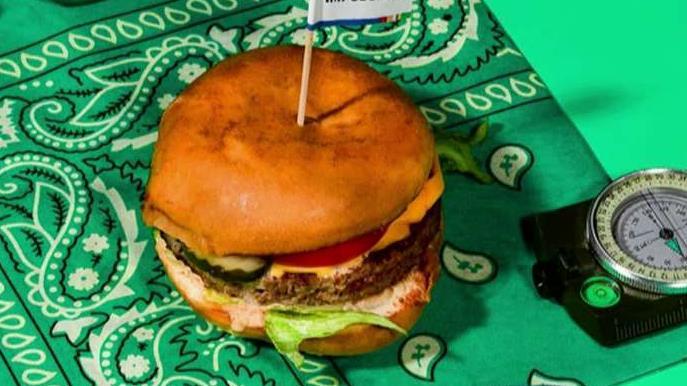Impossible Foods CEO's first job? Serving up sloppy joes and cleaning grease
Impossible Foods, the maker of the plant-based Impossible Burger and substitutes for meat products like beef, wants to elimante the need for animal products in the food chain by 2035.
The California-based company is disrupting the $4.5 billion plant-based market competing with the likes of Beyond Meat with its magic ingredient heme, a red iron molecule found in meat and some plants that makes food cook, bleed and taste like beef. It's target market: meat eaters looking to diversify their protein intake.
Since it debuted in 2016, the Impossible Burger has sold in restaurants like Bareburger, Del Frisco's Grille and nationwide at fast food chains like Burger King and White Castle. The company just rolled out its meatless product at grocery stores including Wegmans, Fairway Market locations in Manhattan and on the West Coast at Gelson's Markets.
FOX Business spoke with Impossible Foods CEO Pat Brown about scaling the business, fund raising and what's next for the alternative meat market.
FOX Business: What's the first thing you do when you wake up in the morning?
Pat Brown: This sounds very mundane, but I really do start the day with coffee, which is usually all I eat for breakfast.
FOX Business: What was your first job? What did you learn?
Brown: I worked two jobs in a greasy spoon restaurant locally famous for its sloppy joes while I was in high school in Virginia. One of my jobs was to scoop out sloppy joe mix and put it on a bun on a plate for the server to deliver to the customer. Then when the restaurant closed at night, my second job was to scrape the grease off the counters, walls and hoods of stoves.
FOX Business: How much of your own money did you have to save up to start Impossible Foods?
Brown: I invested in some small-scale research projects (like how to make cheese from nut milk), but my personal investment was negligible. The seed funding was $3M from Khosla Ventures in 2011.
FOX Business: What are the biggest challenges of scaling your business?
Brown: Scaling up production of a physical product deeply tied to farming is hard -- hard, but doable. For instance, in order to have a robust supply chain, we need to predict what consumer demand will be in two years and engage with farmers now to ensure that they've planted enough sunflower seeds. You have to make investments 18-to-24-months in advance -- a complicated and high-stakes challenge.
FOX Business: What was your biggest money mistake, and what did you learn?
Brown: Shortly after the company was founded in 2011, we tried to cultivate heme directly from plowing up soybean nodules on farms. It took us time and we burned through $1.5M in funding to realize that the better and vastly more efficient way to get heme was through fermentation. But the good news is that that early experiment got us enough soy leghemoglobin to discover that it was the key to meat's unique flavor, so it was probably worth the money in the end. We don't have a roadmap and we're trying to do something unprecedented; some of our experiments will and some won't succeed; we have to be cool with that.
FOX Business: What's next for Impossible Foods, and the future of alternative meat?
GET FOX BUSINESS ON THE GO BY CLICKING HERE
Brown: We are dead serious about our mission to eliminate the need for animals in the food chain by 2035. That means we need to have plant-based versions of all meat and dairy products in every sales category in every part of the world. So you'll see more and more availability in restaurants and retail establishments throughout the USA and in new markets.
FOX Business: What advice do you have to entrepreneurs starting their own businesses?
Brown: Do something that matters. If you figure out how to do something that will make a big, positive difference in the world, your chances of success will be vastly higher than if you're just trying to make a buck with some cookie-cutter product that no one really needs.




















